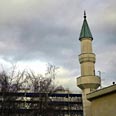
Left-wing activists in Switzerland are planning a new initiative to overturn the ban on the construction of minarets in the country, the British "Independent" reported on Monday.
According to the report, the initiative is meant to restore Muslim's faith in the country's institutions, as well as Switzerland's standing in the world.
In a referendum carried out last week, 57% of the country's citizens voted in favor of banning the construction of new minarets. Justice Minister Evelyn Widmer-Schlumpf said following the approval of the initiative, that the ban would be effective immediately, but is not set in stone and could be overturned.
A group of 20 Swiss intellectuals called Club Helvetique has formulated an action plan to tackle the ban. "A new initiative is the most democratic way of achieving this," attorney Joerg Mueller of Club Helvetique said.
Switzerland's conservative SVP party which led the campaign for the ban said in response: "The Club Helvetique is an association of bad losers."
The results of the referendum enraged many in the country and major protests by leftists in Zurich, Bern and Basel were seen over the weekend.
According to the report, those who oppose the ban have already filed two petitions to the federal court claiming it is a violation of freedom of religion.
Responses from around the world were also quick to follow. Libyan leader Muammar Gaddafi, a known critic of Switzerland ever since the country took legal measures against his son, threatened to reexamine the status of Christians in his country and consider changing its policies regarding the churches they operate.
According to Gaddafi, by banning minarets, the Swiss are "playing with fire, which increases hatred and violence."
Iranian Foreign Minister Manouchehr Mottaki phoned the Swiss foreign minister and warned of the "repercussions" the implementation of the ban would bring with it. Mottaki told his counterpart Micheline Calmy Rey that the referendum's results go "against the prestige of a country which claims to be an advocate of democracy and human rights.”
The foreign minister hoped the Bern government would soon “take necessary steps and find a constitutional way to prevent imposition of the ban.”















